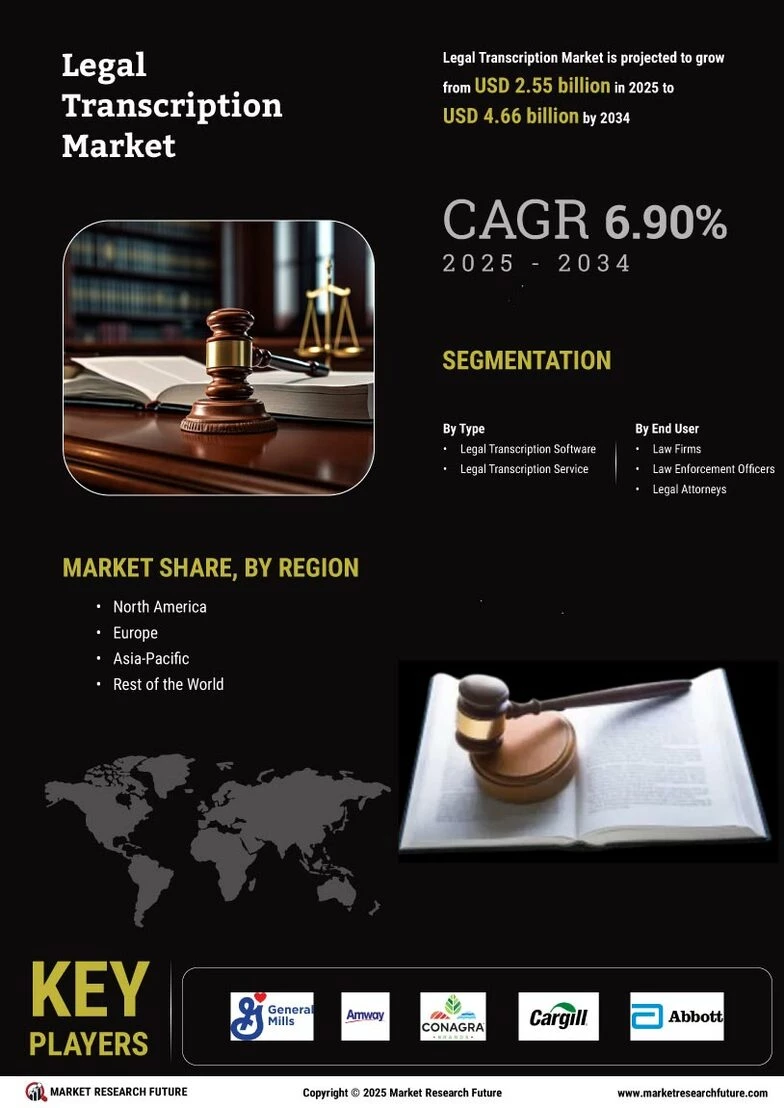Legal Transcription: An Essential Component of the Legal Industry
Legal transcription plays a crucial role in the modern legal system by transforming spoken words from legal proceedings into accurate written records. This process involves converting audio or video recordings of court hearings, depositions, client meetings, and other legal proceedings into text. Accurate legal transcription is vital, as it ensures that all parties have a reliable account of the proceedings, which can be referred to in future cases or legal documentation.
Source - https://www.marketresearchfuture.com/reports/legal-transcription-market-12066
The demand for legal transcription services has grown steadily due to the increasing complexity of legal cases and the need for precise documentation. Law firms, corporate legal departments, courts, and government agencies rely on skilled legal transcriptionists to produce error-free transcripts that meet strict legal standards. These professionals must have a strong understanding of legal terminology, procedures, and confidentiality protocols to ensure the integrity of the transcribed content.
One of the key aspects of legal transcription is accuracy. Legal transcripts must be precise and free of errors, as even minor mistakes can lead to misunderstandings, misinterpretations, or legal complications. Transcriptionists often use specialized software and high-quality audio equipment to enhance the clarity of recordings, making it easier to capture every word accurately. Additionally, they follow rigorous proofreading and editing processes to ensure that the final transcript meets professional and legal standards.
Confidentiality is another critical factor in legal transcription. Legal transcriptionists often handle sensitive information related to ongoing cases, personal client details, and proprietary corporate data. Maintaining strict confidentiality is not only a professional obligation but also a legal requirement in many jurisdictions. Transcription companies implement secure file transfer systems, encrypted storage solutions, and non-disclosure agreements to protect client information from unauthorized access.
The legal transcription industry has also seen significant technological advancements in recent years. Automated transcription software, powered by artificial intelligence, is increasingly used to speed up the transcription process. However, human transcriptionists remain essential for reviewing and editing these transcripts, as AI systems may struggle with complex legal terminology, accents, or poor-quality recordings. The combination of human expertise and technology ensures both efficiency and accuracy in producing legal documents.
In addition to courts and law firms, legal transcription services are essential for attorneys preparing for trials, depositions, or negotiations. Accurate transcripts help legal professionals analyze testimonies, identify discrepancies, and develop effective strategies. They also provide an official record that can be referenced in appeals or legal disputes, ensuring transparency and accountability within the legal system.
Legal transcription plays a crucial role in the modern legal system by transforming spoken words from legal proceedings into accurate written records. This process involves converting audio or video recordings of court hearings, depositions, client meetings, and other legal proceedings into text. Accurate legal transcription is vital, as it ensures that all parties have a reliable account of the proceedings, which can be referred to in future cases or legal documentation.
Source - https://www.marketresearchfuture.com/reports/legal-transcription-market-12066
The demand for legal transcription services has grown steadily due to the increasing complexity of legal cases and the need for precise documentation. Law firms, corporate legal departments, courts, and government agencies rely on skilled legal transcriptionists to produce error-free transcripts that meet strict legal standards. These professionals must have a strong understanding of legal terminology, procedures, and confidentiality protocols to ensure the integrity of the transcribed content.
One of the key aspects of legal transcription is accuracy. Legal transcripts must be precise and free of errors, as even minor mistakes can lead to misunderstandings, misinterpretations, or legal complications. Transcriptionists often use specialized software and high-quality audio equipment to enhance the clarity of recordings, making it easier to capture every word accurately. Additionally, they follow rigorous proofreading and editing processes to ensure that the final transcript meets professional and legal standards.
Confidentiality is another critical factor in legal transcription. Legal transcriptionists often handle sensitive information related to ongoing cases, personal client details, and proprietary corporate data. Maintaining strict confidentiality is not only a professional obligation but also a legal requirement in many jurisdictions. Transcription companies implement secure file transfer systems, encrypted storage solutions, and non-disclosure agreements to protect client information from unauthorized access.
The legal transcription industry has also seen significant technological advancements in recent years. Automated transcription software, powered by artificial intelligence, is increasingly used to speed up the transcription process. However, human transcriptionists remain essential for reviewing and editing these transcripts, as AI systems may struggle with complex legal terminology, accents, or poor-quality recordings. The combination of human expertise and technology ensures both efficiency and accuracy in producing legal documents.
In addition to courts and law firms, legal transcription services are essential for attorneys preparing for trials, depositions, or negotiations. Accurate transcripts help legal professionals analyze testimonies, identify discrepancies, and develop effective strategies. They also provide an official record that can be referenced in appeals or legal disputes, ensuring transparency and accountability within the legal system.
Legal Transcription: An Essential Component of the Legal Industry
Legal transcription plays a crucial role in the modern legal system by transforming spoken words from legal proceedings into accurate written records. This process involves converting audio or video recordings of court hearings, depositions, client meetings, and other legal proceedings into text. Accurate legal transcription is vital, as it ensures that all parties have a reliable account of the proceedings, which can be referred to in future cases or legal documentation.
Source - https://www.marketresearchfuture.com/reports/legal-transcription-market-12066
The demand for legal transcription services has grown steadily due to the increasing complexity of legal cases and the need for precise documentation. Law firms, corporate legal departments, courts, and government agencies rely on skilled legal transcriptionists to produce error-free transcripts that meet strict legal standards. These professionals must have a strong understanding of legal terminology, procedures, and confidentiality protocols to ensure the integrity of the transcribed content.
One of the key aspects of legal transcription is accuracy. Legal transcripts must be precise and free of errors, as even minor mistakes can lead to misunderstandings, misinterpretations, or legal complications. Transcriptionists often use specialized software and high-quality audio equipment to enhance the clarity of recordings, making it easier to capture every word accurately. Additionally, they follow rigorous proofreading and editing processes to ensure that the final transcript meets professional and legal standards.
Confidentiality is another critical factor in legal transcription. Legal transcriptionists often handle sensitive information related to ongoing cases, personal client details, and proprietary corporate data. Maintaining strict confidentiality is not only a professional obligation but also a legal requirement in many jurisdictions. Transcription companies implement secure file transfer systems, encrypted storage solutions, and non-disclosure agreements to protect client information from unauthorized access.
The legal transcription industry has also seen significant technological advancements in recent years. Automated transcription software, powered by artificial intelligence, is increasingly used to speed up the transcription process. However, human transcriptionists remain essential for reviewing and editing these transcripts, as AI systems may struggle with complex legal terminology, accents, or poor-quality recordings. The combination of human expertise and technology ensures both efficiency and accuracy in producing legal documents.
In addition to courts and law firms, legal transcription services are essential for attorneys preparing for trials, depositions, or negotiations. Accurate transcripts help legal professionals analyze testimonies, identify discrepancies, and develop effective strategies. They also provide an official record that can be referenced in appeals or legal disputes, ensuring transparency and accountability within the legal system.
0 Comments
0 Shares
330 Views
0 Reviews


